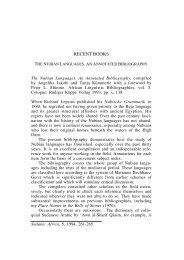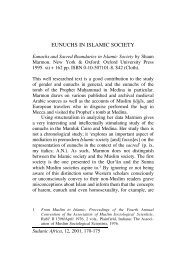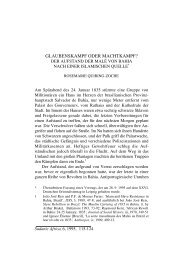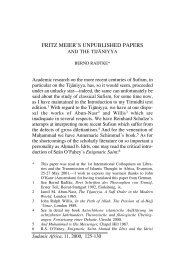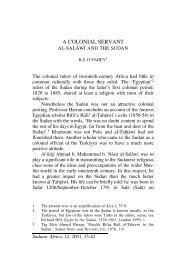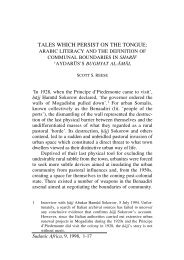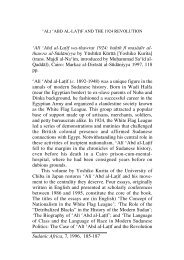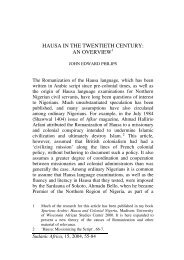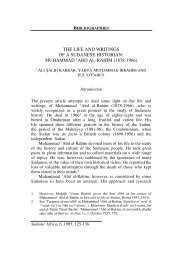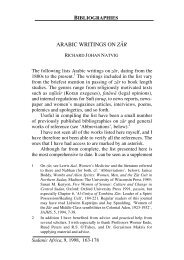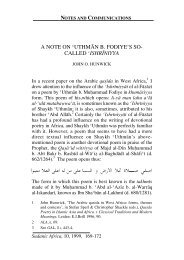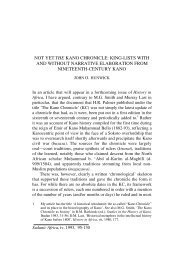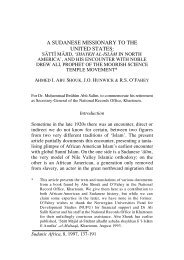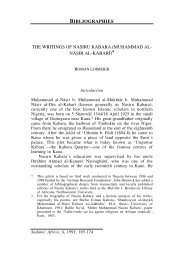Muslim Women's Quest for Equality: Between Islamic Law and ...
Muslim Women's Quest for Equality: Between Islamic Law and ...
Muslim Women's Quest for Equality: Between Islamic Law and ...
You also want an ePaper? Increase the reach of your titles
YUMPU automatically turns print PDFs into web optimized ePapers that Google loves.
Critical Inquiry / Summer 2006 639<strong>Muslim</strong> women who acquired a feminist consciousness at the time <strong>and</strong>who sought equal rights <strong>for</strong> women were under pressure to con<strong>for</strong>m toanticolonialist <strong>and</strong> nationalist priorities, as well as to the secularist, modernist,yet despotic agenda of the new states. Some scholars have arguedthatat the start of the twentieth century the boundary between Islam <strong>and</strong> feminismwas not so clearly marked <strong>and</strong> that women often tried to change traditionallaws by invoking <strong>and</strong> relying on Islam’s sacred texts. 17 But it was inthis period too that women became symbols of cultural authenticity <strong>and</strong>carriers of a religious tradition <strong>and</strong> way of life, which meant that any dissenton their part could be construed as a kind of betrayal or could be silenced.Contemporary Western feminists could criticize the patriarchal elementsof their own cultures <strong>and</strong> religions in the name of modernity, liberalism,<strong>and</strong> democracy, but <strong>Muslim</strong>s could not draw on these external ideologiesor on internal political ideologies in their fight <strong>for</strong> equal rights. For boththe colonialists <strong>and</strong> the modernizing secularists, <strong>Islamic</strong> law was the embodimentof a backward system that had to be rejected or tamed in thenameof progress. For anticolonialists <strong>and</strong> most nationalists, feminism—that is,advocacy of women’s rights—was a colonialist project that had to be resisted.Meanwhile, undemocratic <strong>Muslim</strong> “modernists” gave a new legal<strong>for</strong>ce to the gender inequalities prescribed by classical <strong>Islamic</strong> jurists. As aconsequence, many <strong>Muslim</strong> women faced a painful choice, as Ahmed putsit, “between betrayal <strong>and</strong> betrayal.” 18 They had to choose between their<strong>Muslim</strong> identity—their faith—<strong>and</strong> their new gender awareness.But as the twentieth century drew to a close, this dilemma disappeared.One neglected <strong>and</strong> paradoxical consequence of the rise of political Islam inthe second half of the century was that it helped to create a space, an arena,within which <strong>Muslim</strong> women could reconcile their faith <strong>and</strong> identity witha struggle <strong>for</strong> gender equality. This did not happen because the Islamistsoffered an egalitarian vision of gender relations; in fact, they did not.Rather,their very agenda—the so-called return to sharia—<strong>and</strong> their attempt totranslate into policy the patriarchal gender notions inherent in traditional<strong>Islamic</strong> law provoked many women to increasing criticism of these notions<strong>and</strong> spurred them to greater activism. A growing number of women cameto see no inherent or logical link between <strong>Islamic</strong> ideals <strong>and</strong> patriarchy, nocontradiction between <strong>Islamic</strong> faith <strong>and</strong> feminism, <strong>and</strong> to free themselvesEngl<strong>and</strong>, 1991); <strong>and</strong> Paidar, Women <strong>and</strong> the Political Process in Twentieth-Century Iran (Cambridge,1995).17. On Egypt, see Margot Badran, Feminists, Islam, <strong>and</strong> Nation: Gender <strong>and</strong> the Making ofModern Egypt (Princeton, N.J., 1995). On Iran, see Paidar, Women <strong>and</strong> the Political Process inTwentieth-Century Iran.18. Ahmed, “Early Feminist Movements in the Middle East: Turkey <strong>and</strong> Egypt,” in <strong>Muslim</strong>Women, ed. Freda Hussain (London, 1984), p. 122.



